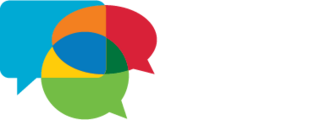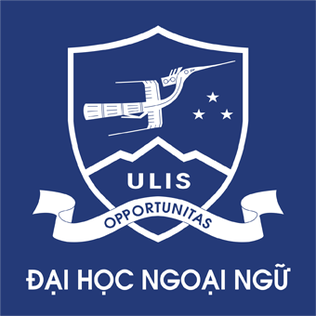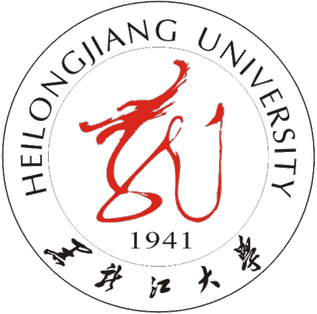Related Research Articles

International students, or foreign students, are students who undertake all or part of their tertiary education in a country other than their own.
Education in China is primarily managed by the state-run public education system, which falls under the Ministry of Education. All citizens must attend school for a minimum of nine years, known as nine-year compulsory education, which is funded by the government.

Xi'an International Studies University is a provincial public linguistics university located in Xi'an, Shaanxi, China. The university is affiliated with and funded by the Province of Shaanxi.

Hankuk University of Foreign Studies is a private research university based in Seoul, in South Korea. The university currently teaches 45 foreign languages. In addition, it contains studies in humanities, law, political science, social sciences, business, medical science, natural sciences, and engineering.
A medium of instruction is a language used in teaching. It may or may not be the official language of the country or territory. If the first language of students is different from the official language, it may be used as the medium of instruction for part or all of schooling. Bilingual education or multilingual education may involve the use of more than one language of instruction. UNESCO considers that "providing education in a child's mother tongue is indeed a critical issue". In post-secondary, university and special education settings, content may often be taught in a language that is not spoken in the students' homes. This is referred to as content based learning or content and language integrated learning (CLIL). In situations where the medium of instruction of academic disciplines is English when it is not the students' first language, the phenomenon is referred to as English-medium instruction (EMI).
A language school is a school where one studies a foreign language. Classes at a language school are usually geared towards, for example, communicative competence in a foreign language. Language learning in such schools typically supplements formal education or existing knowledge of a foreign language.

Education in South Korea is provided by both public schools and private schools. Both types of schools receive funding from the government, although the amount that the private schools receive is less than the amount of the state schools.
An international school is an institution that promotes education in an international environment or framework. Although there is no uniform definition or criteria, international schools are usually characterized by a multinational student body and staff, multilingual instruction, curricula oriented towards global perspectives and subjects, and the promotion of concepts such as world citizenship, pluralism, and intercultural understanding. Many international schools adopt a curriculum from programs and organizations such as International Baccalaureate, Edexcel, Cambridge Assessment International Education, International Primary Curriculum, or Advanced Placement.

The Poljane Upper Secondary School is located in Ljubljana, the capital of Slovenia. It is a coeducational nondenominational state secondary general education school for students aged between 15 and 19. It prepares them for university, which they can enroll at after passing the matura.
Less Commonly Taught Languages is a designation used in the United States for languages other than the most commonly taught foreign languages in US public schools. The term covers a wide array of world languages, ranging from some of the world's largest and most influential, and holds international recognization such as Chinese, Russian, Arabic, Bengali, Hindi, Portuguese, Japanese, Persian, Urdu, Turkish, Swahili, Italian, and Tamil to smaller regional languages studied in the US mainly by area experts, such as Twi, spoken in West Africa, and Finnish.

Education in Azerbaijan is regulated by the Ministry of Education of Azerbaijan.
The Sogang University Korean Language Education Center provides instruction in Korean language to foreigners in Korea in Mapo-gu, Seoul. The Sogang program is one of the three Korean language programs approved by the Blakemore Foundation for its advanced study grants for 2013.

The National Security Language Initiative (NSLI) is a program introduced by United States President George W. Bush on January 5, 2006 at the U.S. University President's Summit to develop the foreign language skills of American high school students, especially in "critical-need" foreign languages such as Arabic, Mandarin Chinese, Russian, Hindi, and Persian. The initiative was given $114 million in fiscal year 2007 and $26.6 million in 2008 to expand programs from kindergarten level to universities. Schools were additionally awarded $750 million for critical language education.

VNU University of Languages and International Studies, or Hanoi University of Languages and International Studies, is one of the six colleges that comprise Vietnam National University, Hanoi. The school offers undergraduate and graduate degrees in pedagogy and linguistic studies in Arabic, English, French, German, Japanese, Korean, Mandarin Chinese, Russian, Spanish and Thai. The college is located at VNU Cau Giay campus.

The Heilongjiang University is a provincial public university in the Harbin, Heilongjiang, China. The university is affiliated with the Province of Heilongjiang. It is co-sponsored by the Province of Heilongjiang, the Ministry of Education, and SASTIND.

The School for International Training, widely known by its initials SIT, is a private non-profit regionally-accredited institution headquartered in Brattleboro, Vermont, United States. The institution has two main divisions. SIT Graduate Institute administers a wide range of internationally-focused master's degree programs as well as a Doctor of Education degree in Global Education. SIT Study Abroad administers undergraduate study abroad programs which combine field-based experiential learning with academic research or internship opportunities.
The Institute of Modern Languages, also known as IML-UQ, is a language and translation institute located within the St Lucia campus of the University of Queensland (UQ) in Brisbane, Australia. Today IML-UQ enrolls 3000 plus students annually in all of its language programs.
Teaching English as a second (TESL) or foreign language (TEFL) and Teaching English to speakers of other languages (TESOL) are terms that refer to teaching English to students whose first language is not English. The terms TEFL, TESL, and TESOL distinguish between a class's location and student population, and have become problematic due to their lack of clarity. TEFL refers to English-language programs conducted in countries where English is not the primary language, and may be taught at a language school or by a tutor. For some jobs, the minimum TEFL requirement is a 100-hour course; the 120-hour course is recommended, however, since it may lead to higher-paid teaching positions. TEFL teachers may be native or non-native speakers of English.
The following is a list of bilingual education by country or region.

Korean as a foreign language is the study of the Korean language by anyone who is not a native speaker, regardless of Korean ethnicity.
References
- 1 2 3 "Challenges and Prospects for Korean Language Education in Russia". Sino-NK . May 8, 2023.